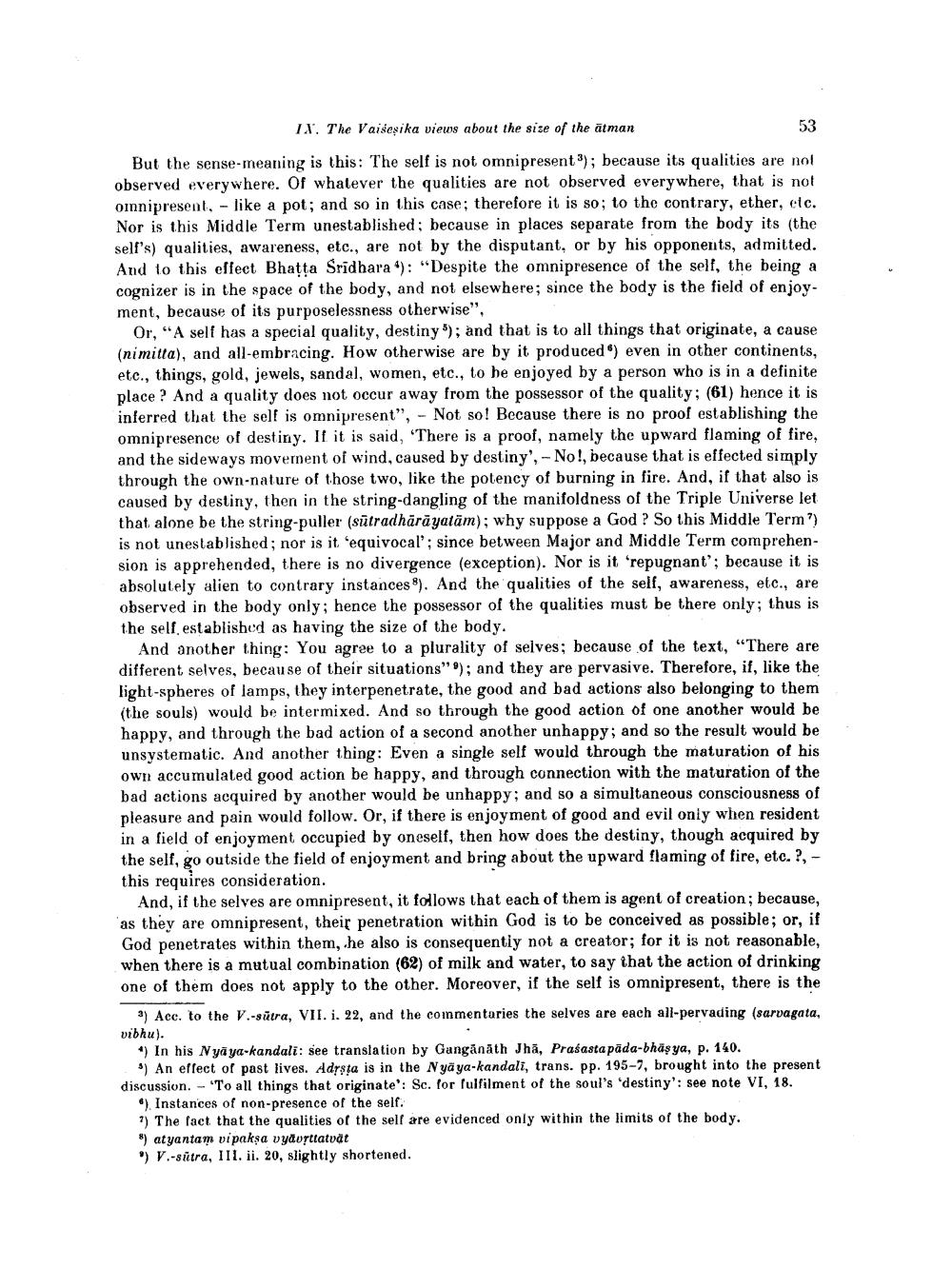________________
LX. The Vaiseșika views about the size of the ātman
But the sense-meaning is this: The self is not omnipresent); because its qualities are not observed everywhere. Of whatever the qualities are not observed everywhere, that is not oinnipresent, - like a pot; and so in this case; therefore it is so; to the contrary, ether, etc. Nor is this Middle Term unestablished; because in places separate from the body its (the self's) qualities, awareness, etc., are not by the disputant, or by his opponents, admitted. And to this effect Bhatta Sridhara"): "Despite the omnipresence of the sell, the being a cognizer is in the space of the body, and not elsewhere; since the body is the field of enjoyment, because of its purposelessness otherwise",
Or, "A selt has a special quality, destiny'); and that is to all things that originate, a cause (nimitta), and all-embracing. How otherwise are by it produced) even in other continents, etc., things, gold, jewels, sandal, women, etc., to be enjoyed by a person who is in a definite place ? And a quality does not occur away from the possessor of the quality; (61) hence it is inferred that the sell is omnipresent", - Not so! Because there is no proof establishing the omnipresence of destiny. If it is said, 'There is a proof, namely the upward flaming of fire, and the sideways movement of wind, caused by destiny', - No!, because that is effected simply through the own-nature of those two, like the potency of burning in fire. And, if that also is caused by destiny, then in the string-dangling of the manifoldness of the Triple Universe let that alone be the string-puller (sūtradhārāyatām); why suppose a God ? So this Middle Term is not unestablished; nor is it "equivocal'; since between Major and Middle Term comprehension is apprehended, there is no divergence (exception). Nor is it repugnant'; because it is absolutely alien to contrary instances 8). And the qualities of the self, awareness, etc., are observed in the body only; hence the possessor of the qualities must be there only; thus is the self established as having the size of the body.
And another thing: You agree to a plurality of selves; because of the text, “There are different selves, because of their situations"); and they are pervasive. Therefore, if, like the light-spheres of lamps, they interpenetrate, the good and bad actions also belonging to them (the souls) would be intermixed. And so through the good action of one another would be happy, and through the bad action of a second another unhappy; and so the result would be unsystematic. And another thing: Even a single self would through the maturation of his own accumulated good action be happy, and through connection with the maturation of the bad actions acquired by another would be unhappy; and so a simultaneous consciousness of pleasure and pain would follow. Or, if there is enjoyment of good and evil only when resident in a field of enjoyment occupied by oneself, then how does the destiny, though acquired by the self, go outside the field of enjoyment and bring about the upward flaming of fire, etc. ?,this requires consideration.
And, if the selves are omnipresent, it follows that each of them is agent of creation; because, as they are omnipresent, their penetration within God is to be conceived as possible; or, if God penetrates within them, he also is consequentiy not a creator; for it is not reasonable, when there is a mutual combination (62) of milk and water, to say that the action of drinking one of them does not apply to the other. Moreover, if the self is omnipresent, there is the
3) Acc. to the V.-sutra, VII. i. 22, and the commentaries the selves are each all-pervading (sarvagata, vibhu).
*) In his Nyāya-kandali: see translation by Gangănāth Jhā, Praśasta pāda-bhāşya, p. 140.
“) An effect of past lives. Adrsta is in the Nyaya-kandali, trans. pp. 195-7, brought into the present discussion. - "To all things that originate': Sc. for fulfilment of the soul's 'destiny': see note VI, 18.
*), Instances of non-presence of the self. 7) The fact that the qualities of the sell are evidenced only within the limits of the body. 8) atyantam vi pakşa vyaupttatvat ) V.-sutra, Ill. ii. 20, slightly shortened.




